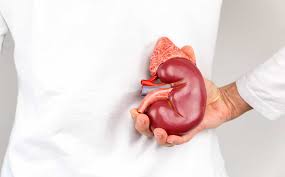Article
Getting to Ring the Bell
Author(s):
A clinical trial and a positive attitude helped Bill Brown ring the bell.
October 30, 2019 was an emotional day for Bill Brown. After 32 immunotherapy infusions to treat kidney cancer over two years, Bill was about to head into his final treatment.
But first, a quick stop.
“It’s been quite a journey,” he told the family and staff from MD Anderson Cancer Center in Houston, Texas who had gathered to watch. “Two and a half years from surgery to today… and together, we beat cancer!”
With that, Bill clanged a bell to signify the end of his treatment, raised his arms in victory, and accepted a hug from his oncologist, Dr. Nizar Tannir.
Dr. Tannir, had recommended Bill receive treatment as part of a clinical trial designed to find the highest tolerable dose of an interleukin-2 drug called NKTR-214 (bempegaldesleukin), which could be given in combination with either nivolumab (Opdivo) or other anti-cancer therapies, in patients with metastatic cancer, including kidney cancer.

Bill had success with treatment.
“Things progressed so well in two years. I didn’t have the side effects or have to stop treatment like so many others,” Bill said.
“It was a trial as far as every three weeks, I know I’d feel like crap for four days. My social life may halt. I may not be able to work. I took that in stride because I learned how to deal with it for that time period and say, now I have three weeks to be normal.”
But soon after his final infusion, his condition took a turn. Although Bill felt ill for a few days following his infusions, that was typically the extent of the effects of immunotherapy. However, after his last treatment, Bill suffered a stroke.
Ultimately, the stroke was mild. Bill said he went back to his job as a petroleum engineer the next week and that he felt back to normal after a month. But the experience, so soon after the end of his treatments, still shook him up.
“It was an interesting turn of events for my last treatment,” he said. “It was just the darndest thing.”
Maintaining a positive, hopeful attitude with support from family, friends, work colleagues, and, importantly, their faith, was critical in helping Bill and his wife Julie Brown maintain a relatively normal routine and stay mentally and emotionally strong.
One friend dropped off batches of chicken noodle soup, one of the comforting things Bill felt he could eat following treatments, regularly. The Browns’ children checked in with their parents often.
“My close friends and family always asked how I was doing and what’s going on. It’s a big deal to know who truly cares and is interested in your wellbeing,” Bill said.
“I feel like my healing and my treatment was a godsend and I’m very blessed. “It can change, it could be different tomorrow, but there’s no reason to worry about that. I’ve tried not to worry about things I couldn’t control.”
“When you’re diagnosed with cancer, you don’t know how you’re going to react. All the unknowns are really scary,” said Julie, who is a trained nurse. “Bill is really, really lucky compared to a lot of families.”
Over time, the Browns grew more interested in research and advocacy. They joined the Kidney Cancer Association in advocating for increased research funding in Washington DC last October.
“Without awareness, research, money, and focus, we don’t get anywhere.” Bill said. “I’m excited the cancer community is making progress in that regard — we’re learning a lot in a hurry.”
For those who know people affected by kidney cancer, Bill said a helpful attitude can make the biggest impact.
“Ask, what can we do to help your life be more easy? Can we run errands, bring food, go to the library? Maybe they’re little things but they mean a lot.”
“I would encourage people,” Julie said. “The minute you hear [cancer], you always have to have hope and stay strong… don’t let that get you down.”




